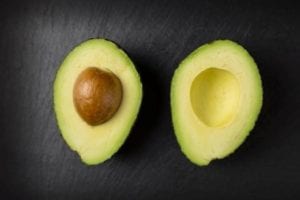Written by Jessica Patella, ND. Daily avocado consumption increased beneficial microbes capable of fiber fermentation, resulting in lower fecal bile acid concentrations and greater fecal fatty acids.
 The majority of American’s are overweight or obese, making it a national health concern. Research is starting to observe connections between increased fat mass and altered gastrointestinal microbes 1,2. One food of interest, avocado, has shown in preliminary studies to impact gut microbes, but more research is needed 1,3. Combining this information researchers evaluated the impact of avocado consumption on gastrointestinal microbes and metabolites in overweight and obese individuals 1.
The majority of American’s are overweight or obese, making it a national health concern. Research is starting to observe connections between increased fat mass and altered gastrointestinal microbes 1,2. One food of interest, avocado, has shown in preliminary studies to impact gut microbes, but more research is needed 1,3. Combining this information researchers evaluated the impact of avocado consumption on gastrointestinal microbes and metabolites in overweight and obese individuals 1.
During the digestion of fats, bile acids, which are formed in the liver, are released from the gallbladder. Bile acids serve as emulsifiers for dietary fat so it can travel in the body for digestion and absorption. A diet higher in saturated and total fat results in more bile acid release 1,4. Since avocados are a good source of fiber and monounsaturated fatty acids (MUFA) 5, and have been shown to lower body weight 6, researchers wanted to evaluate if regular consumption could improve gastrointestinal microbes and metabolites in overweight and obese individuals 1.
The study included adults (25-45 years of age) with a BMI equal to or above 25 kg/m2. Participants were randomized to either a daily meal with avocado (n=79) or an isocaloric meal (n=78) once per day. Participants in the avocado group received 175g (men) or 140 g (women) of fresh Hass avocado daily. Otherwise the daily meals were 90% similar between the groups (avocado being the difference) and they were identical in regards to energy and macronutrients. Meals were prepared at the research site and were picked up twice weekly by all participants 1. Participants also had to provide fecal samples to determine if the diet changed the microbes or metabolites in the gastrointestinal tract 1.
Dietary records were analyzed and showed that baseline avocado intake was low and less than half of all the participants reported consuming any avocado 1. After 12-weeks of intervention participants in the avocado group reported 20g greater MUFA consumption and 14g more of dietary fiber. Dietary saturated and polyunsaturated fat intake was still similar between the 2-groups, despite the avocado group consuming more MUFAs 1.
After 12-weeks the following results were observed in gastrointestinal measures:
- Increased alpha diversity and enriched Faecalibacterium, Lachnospira, and Alistipes microbes capable of fiber fermentation (between 26% and 65% compared to control).
- 18% greater fecal acetate, 70% greater stearic acid and 98% greater palmitic acid concentrations compared to the control group
- Concentrations of bile acids cholic and chenodeoxycholic acid were 91% and 57% lower, respectively compared to the control group.
In conclusion, daily consumption of avocado resulted in increased beneficial microbes and fatty acids, while lowering bile acids in fecal matter. This provides evidence that avocado affects the functioning of digestive tract in overweight and obese individuals 1. This study had strengths in that the food was measured and provided by the study center and it was single-blinded, however, food records were self-reported and therefore may have errors 1.
Source: Thompson, Sharon V., Melisa A. Bailey, Andrew M. Taylor, Jennifer L. Kaczmarek, Annemarie R. Mysonhimer, Caitlyn G. Edwards, Ginger E. Reeser, Nicholas A. Burd, Naiman A. Khan, and Hannah D. Holscher. “Avocado Consumption Alters Gastrointestinal Bacteria Abundance and Microbial Metabolite Concentrations among Adults with Overweight or Obesity: A Randomized Controlled Trial.” The Journal of Nutrition (2020).
© The Author(s) on behalf of the American Society for Nutrition 2020. This is an Open Access article distributed under the terms of the Creative CommonsAttribution License (http://creativecommons.org/licenses/by/4.0/)
Click here to read the full text study.
References:
- Thompson SV, Bailey MA, Taylor AM, et al. Avocado Consumption Alters Gastrointestinal Bacteria Abundance and Microbial Metabolite Concentrations among Adults with Overweight or Obesity: A Randomized Controlled Trial. J Nutr. 2020.
- Duncan SH, Lobley GE, Holtrop G, et al. Human colonic microbiota associated with diet, obesity and weight loss. International journal of obesity (2005). 2008;32(11):1720-1724.
- Henning SM, Yang J, Woo SL, et al. Hass Avocado Inclusion in a Weight-Loss Diet Supported Weight Loss and Altered Gut Microbiota: A 12-Week Randomized, Parallel-Controlled Trial. Current developments in nutrition. 2019;3(8):nzz068.
- Desbois AP, Smith VJ. Antibacterial free fatty acids: activities, mechanisms of action and biotechnological potential. Appl Microbiol Biotechnol. 2010;85(6):1629-1642.
- Dreher ML, Davenport AJ. Hass avocado composition and potential health effects. Crit Rev Food Sci Nutr. 2013;53(7):738-750.
- Fulgoni VL, 3rd, Dreher M, Davenport AJ. Avocado consumption is associated with better diet quality and nutrient intake, and lower metabolic syndrome risk in US adults: results from the National Health and Nutrition Examination Survey (NHANES) 2001-2008. Nutr J. 2013;12:1.

